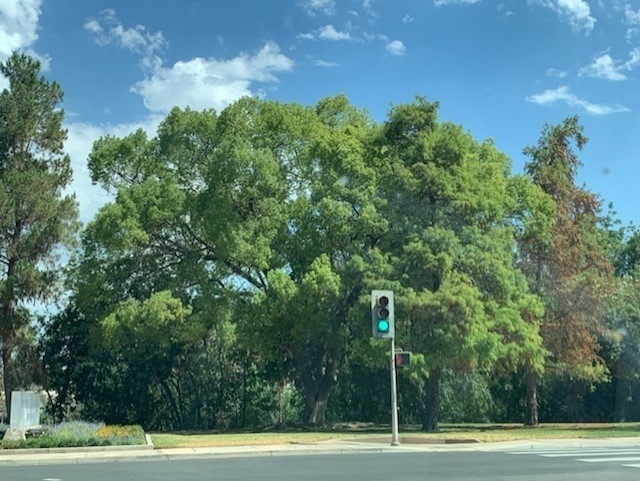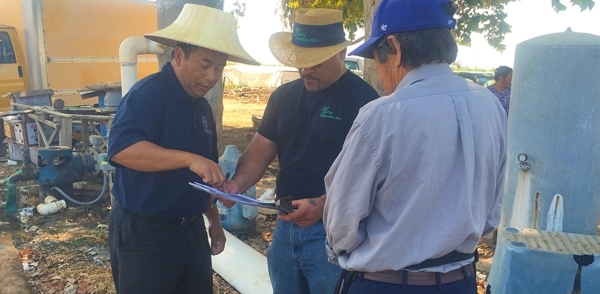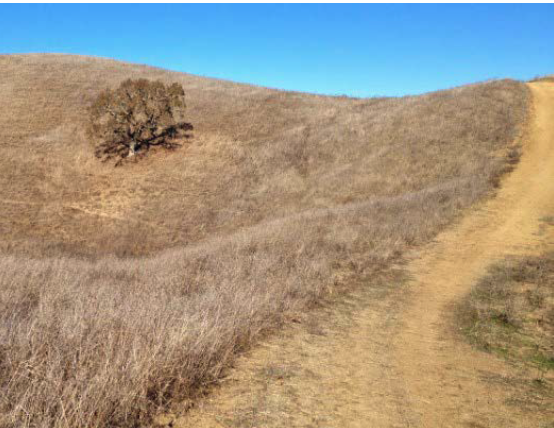Posts Tagged: Richard Smith
Long, Mueller and Smith honored for career achievements
Since 1973, the California Chapter of the ASA has recognized individuals who have made significant contributions to California agriculture during their careers.
As California ASA past president, Michelle Leinfelder-Miles congratulated her UCCE colleagues, all of whom have been granted emeritus status by the university.
“I wish to start off by personally thanking them for their knowledge, experience, commitment to service and mentoring,” said Leinfelder-Miles, who is also UCCE Delta crops resource management advisor for San Joaquin, Sacramento, Yolo, Solano and Contra Costa counties. “You have made a tremendous impact on my career, and, without a doubt, on the careers and lives of many.”
Long retired as a UCCE farm advisor in 2023, after 37 years of doing research on crop production, pollination and pest control in collaboration with farmers, starting in Sonoma County, then San Joaquin County and the last 32 years in Solano, Sacramento and Yolo counties.
“She worked extensively with farmers over the years, learning about global positioning systems (GPS), subsurface drip and healthy soils practices,” said Sarah Light, UCCE agronomy farm advisor for Sutter, Yuba and Colusa counties, who presented Long's award.
“Rachael's work in the late 1990s documented how pesticides were transported offsite from farm fields in surface irrigation water,” Light said, noting Long's research led to the adoption of practices – such as pesticide choice and vegetative filter strips including cover crops – that are now commonly used to protect surface waters from pesticides used on farms. She is currently writing a children's book introducing them to the world of bees.
Mueller, who retired in 2019, was a UCCE advisor in Fresno County and director of the UCCE Fresno/Madera Multi-County Partnership.
“Throughout her 31-year career, Shannon exemplified professionalism on every research project, extension effort, committee, advisory board or workgroup with which she was involved,” said Carol Frate, emeritus UCCE farm advisor, who presented Mueller's award. “The results of Shannon's work with alfalfa seed and pollination resulted in practices used to this day.”
Smith retired as a UCCE vegetable crops advisor in January 2023, but continues to contribute his expertise. Initially hired in 1987 as a UCCE vegetable crop farm advisor in Stanislaus County, Smith transferred to San Benito County in 1989 as the small farms advisor. His role later expanded to UCCE vegetable crops and weed science farm advisor for San Benito, Monterey and Santa Cruz counties.
“Throughout his career, Richard made thousands of farm call visits to assist growers, PCAs and crop consultants with diagnosing crop production problems caused by abiotic conditions, diseases, insects, nutrient deficiency, salinity or chemical sprays,” said Michael Cahn, UCCE irrigation and water resources advisor for the Central Coast, who presented Smith's award. “Richard has also been at the forefront of solving major problems facing the vegetable industry on the Central Coast. One of the most recent and impactful issues was the major loss of lettuce production in 2020 caused by impatiens necrotic spot virus (INSV) and Pythium wilt disease.”
Leinfelder-Miles remarked, “It is rare for the chapter to recognize three UC academics in one year, let alone three Cooperative Extension farm advisors.”
Read the full remarks about the extraordinary contributions Long, Mueller and Smith have made to agriculture in the California Plant and Soil Conference Book of Abstracts posted online at https://na-admin.eventscloud.com/docs/9711/409497.
Climate-Change Resources
University of California UC ANR Green Blog (Climate Change and Other Topics) https://ucanr.edu/blogs/Green/index.cfm?tagname=climate%20change (full index)
Examples:
- Save Trees First: Tips to Keep Them Alive Under Drought https://ucanr.edu/b/~CdD
- Landscaping with Fire Exposure in Mind: https://ucanr.edu/b/~G4D
- Cities in California Inland Areas Must Make Street Tree Changes to adapt to Future Climate https://ucanr.edu/b/~oF7
Drought, Climate Change and California Water Management Ted Grantham, UC Cooperative Extension specialist (23 minutes) https://youtu.be/dlimj75Wn9Q
Climate Variability and Change: Trends and Impacts on CA Agriculture Tapan Pathak, UC Cooperative Extension specialist (24 minutes) https://youtu.be/bIHI0yqqQJc
California Institute for Water Resources (links to blogs, talks, podcasts, water experts, etc.) https://ciwr.ucanr.edu/California_Drought_Expertise/
UC ANR Wildfire Resources (publications, videos, etc.) https://ucanr.edu/News/For_the_media/Press_kits/Wildfire/ (main website)
-UC ANR Fire Resources and Information https://ucanr.edu/sites/fire/ (main website)
-Preparing Home Landscaping https://ucanr.edu/sites/fire/Prepare/Landscaping/
UC ANR Free Publications https://anrcatalog.ucanr.edu/ (main website)
- Benefits of Plants to Humans and Urban Ecosystems: https://anrcatalog.ucanr.edu/pdf/8726.pdf
-Keeping Plants Alive Under Drought and Water Restrictions (English version) https://anrcatalog.ucanr.edu/pdf/8553.pdf
(Spanish version) https://anrcatalog.ucanr.edu/pdf/8628.pdf
- Use of Graywater in Urban Landscapes https://anrcatalog.ucanr.edu/pdf/8536.pdf
- Sustainable Landscaping in California https://anrcatalog.ucanr.edu/pdf/8504.pdf
Other (Non-UC) Climate Change Resources
Urban Forests and Climate Change. Urban forests play an important role in climate change mitigation and adaptation. Active stewardship of a community's forestry assets can strengthen local resilience to climate change while creating more sustainable and desirable places to live. https://www.fs.usda.gov/ccrc/topics/urban-forests
Examining the Viability of Planting Trees to Mitigate Climate Change (plausible at the forest level) https://climate.nasa.gov/news/2927/examining-the-viability-of-planting-trees-to-help-mitigate-climate-change/
Reports and other information resources coordinated under the auspices of the United Nations and produced through the collaboration of thousands of international scientists to provide a clear and up to date view of the current state of scientific knowledge relevant to climate change. United Nations Climate Action
Scientific reports, programs, action movements and events related to climate change. National Center for Atmospheric Research (National Science Foundation)
Find useful reports, program information and other documents resulting from federally funded research and development into the behavior of the atmosphere and related physical, biological and social systems. Search and find climate data from prehistory through to an hour ago in the world's largest climate data archive. (Formerly the "Climatic Data Center") National Centers for Environmental Information (NOAA)
Think tank providing information, analysis, policy and solution development for addressing climate change and energy issues (formerly known as the: "Pew Center on Global Climate Change"). Center for Climate & Energy Solutions (C2ES)
Mapping Resilience: A Blueprint for Thriving in the Face of Climate Disaster. The Climate Adaptation Knowledge Exchange (CAKE) was launched in July 2010 and is managed by EcoAdapt, a non-profit with a singular mission: to create a robust future in the face of climate change by bringing together diverse players to reshape planning and management in response to rapid climate change. https://www.cakex.org/documents/mapping-resilience-blueprint-thriving-face-climate-disaster
Cal-Adapt provides a way to explore peer-reviewed data that portrays how climate change might affect California at the state and local level. We make this data available through downloads, visualizations, and the Cal-Adapt API for your research, outreach, and adaptation planning needs. Cal-Adapt is a collaboration between state agency funding programs, university and private sector researchers https://cal-adapt.org/
Find reports, maps, data and other resources produced through a confederation of the research arms of 13 Federal departments and agencies that carry out research and develop and maintain capabilities that support the Nation's response to global change. Global Change (U.S. Global Change Research Program)
The Pacific Institute is a global water think tank that combines science-based thought leadership with active outreach to influence local, national, and international efforts to develop sustainable water policies. https://pacinst.org/our-approach/
Making equity real in climate adaptation and community resilience policies and programs: a guidebook. https://greenlining.org/publications/2019/making-equity-real-in-climate-adaption-and-community-resilience-policies-and-programs-a-guidebook/
Quarterly CA Climate Updates and CA Drought Monitor Maps (updated each Thursday) https://www.drought.gov/documents/quarterly-climate-impacts-and-outlook-western-region-june-2022
Richard Smith retires after 37 years of translating science into solutions for vegetable growers
For four decades, when a new plant disease infects fields of lettuce or a new regulation is issued for agriculture, vegetable farmers across the state have turned to Richard Smith, the University of California Cooperative Extension vegetable crops advisor, for answers. After 37 years of service with UCCE, Smith retired on Jan. 4.
“The whole industry has been dreading Richard's retirement!” exclaimed Jennifer Clarke, executive director of the California Leafy Greens Research Program. “Richard is a wealth of knowledge and has a great ability to translate science into real-world practical solutions.”
In the past few years, the leafy greens industry has lost millions of dollars of crops due to infections of impatiens necrotic spot virus (INSV) and Pythium wilt. Smith is among the researchers investigating the diseases.
“Richard has conducted important variety trials and led efforts in identifying the ‘top 10' weed hosts for INSV and strategies to reduce the wintertime ‘green bridge' for this virus,” Clarke said.
Smith also has kept policymakers informed of the latest research. In 2021, he testified before the Assembly Committee on Agriculture about leafy green plant diseases.
A legacy of practical advice, service to community
By serving on numerous grower and county committees and working directly with growers, Smith has built a reputation for understanding growers' needs and developing practical solutions. He has found it rewarding to see his research results used.
“The research that I have conducted with my collaborators has helped the water board to better fit their regulations to the reality of farming and to minimize the economic constraints,” Smith said.
Smith and his colleague Michael Cahn, UCCE irrigation and water resources advisor, also have become trusted and respected voices when discussing AgOrder 4.0 with the Central Coast Regional Water Quality Control Board, according to Clarke. AgOrder 4.0 calls for farmers to reduce the amount of fertilizer they apply to crops.
Field trials conducted by Smith and Cahn showed growers they could use nitrogen from high nitrate wells toward meeting a crop's nutritional needs.
“Richard has also done important research to develop nitrogen removal coefficients for AgOrder 4.0,” Clarke said. “Recently he and Eric Brennan of USDA-ARS (Agricultural Research Service) looked at cover crops and identified a system to predict shoot biomass and allow for nitrogen scavenging credits. His work has been pivotal in helping growers comply with AgOrder 4.0 in a cost-effective and realistic manner.”
Growers also use his research to manage cadmium, a heavy metal that is naturally present in soils.
“He led the effort to help growers find a best management practice that reduces cadmium uptake in various crops,” Clarke said. “The Central Coast has areas of productive agricultural land where there are naturally occurring shale deposits. The ability to amend soil to reduce plant uptake of this heavy metal has allowed these important production areas to continue to farm nutritious vegetables.”
‘Never had a bad day as a farm advisor'
Growing up in Watsonville, Smith began working at a young age in agriculture for summer jobs.
“I was in 4-H and got to know ag advisors and was always impressed by them,” Smith said. “I was fortunate to be able to work as an advisor for my career. I never had a bad day as a farm advisor – it was very satisfying working with growers and helping them with their issues.”
Smith joined UC Cooperative Extension as a farm advisor intern in San Diego County and San Joaquin County in 1985 after earning his master's degree in agronomy from UC Davis. In 1986, he moved to the Central Valley to serve as an interim farm advisor for San Joaquin County, then became a vegetable crops farm advisor for Stanislaus County in 1987.
In 1989, Smith moved to the Central Coast to serve as UCCE small farms advisor for San Benito, Monterey and Santa Cruz counties. In 1999, he transitioned to UCCE vegetable crops and weed science farm advisor for those three counties, where he served for the rest of his career.
Mentoring the next generation of scientists
“Richard was my mentor, principal investigator on my first collaborative study at ANR, speaker at several of my extension events, and a dear colleague,” said Surendra Dara, former UCCE entomology and biologicals advisor and now director of Oregon State University's North Willamette Research & Extension Center and professor of horticulture. “He is very kind, friendly, and most importantly has a good sense of humor. He is well-regarded both by his peers and stakeholders.”
Smith has been active in professional organizations, regularly attending the annual meetings of the American Society for Horticulture Science and the American Society of Agronomy. He served as president of the California Chapter of the American Society of Agronomy in 2014 and served on the board of the California Weed Science Society, which granted him the Award of Excellence in 2005 and an honorary membership in 2020.
As a public service, Smith served on the board of the Agriculture and Land-Based Training Association, and taught classes and conducted outreach to their Spanish-speaking clientele. He was a regular guest speaker for vegetable crop and weed science classes at CSU Fresno, CSU Monterey Bay, Cal Poly San Luis Obispo, Hartnell Community College and Cabrillo Community College.
As he winds down his career, Smith has been mentoring new UCCE farm advisors and scientists who have joined USDA-Agricultural Research Service in Salinas and California State University, Monterey Bay, acquainting them with local issues.
“Richard's leadership and mentorship has been critical in the development of my career as a new researcher at USDA-ARS in Salinas,” said Daniel K. Hasegawa, research entomologist in USDA-ARS's Crop Improvement and Protection Research Unit. “Richard has taught me so much about agricultural practices in the Salinas Valley and has connected me with growers and pest control advisers, which has enhanced the impact of my own research, which includes projects addressing thrips and INSV.”
Smith, who has been granted emeritus status by UC Agriculture and Natural Resources, plans to complete nitrogen research projects that are underway.
Richard Smith retires after 37 years of translating science into solutions for vegetable growers
For four decades, when a new plant disease infects fields of lettuce or a new regulation is issued for agriculture, vegetable farmers across the state have turned to Richard Smith, the University of California Cooperative Extension vegetable crops...
Drought focus of Water Resources IMPACT magazine special issue
UC ANR experts address emotional toll of drought
Preparing the American West for prolonged drought is the focus of a double issue of Water Resources IMPACT magazine. The California Water Commission staff are guest editors for this special open-access edition of the magazine, which is published by the American Water Resources Association.
Faith Kearns, academic coordinator of University of California Agriculture and Natural Resources' California Institute for Water Resources, is among the authors delving into how drought impacts people and the environment and how we can better prepare for the inevitable.
The first issue, published on Feb. 14, focuses on water scarcity issues confronting California and the ways these issues affect different sectors.
In “Trauma, Care, and Solidarity: Addressing the Emotional Toll of Chronic Drought,” Kearns highlights the effects of drought on mental health. She points to the spike in suicide hotline calls when wells ran dry in Southeast Asian communities in California's Central Valley.
By listening to Southeast Asian farmers, Ruth Dahlquist-Willard and Michael Yang of UC Cooperative Extension were able to “lighten the load” for them by providing pragmatic support, Kearns writes.
“The scale of some of these highly emotional issues – drought, wildfires, climate change – can make them seem incredibly difficult, if not impossible, to deal with,” Kearns said. “At the same time, they are affecting everyone living in the western U.S. on a daily basis. I wanted to highlight and provide models based on work that people – whether they are researchers, clinical psychologists, or Cooperative Extension advisors – are doing right now to ease the way.”
The authors who contributed to the double issue are a diverse array of Tribal experts, academics, nongovernmental organization thought-leaders, water managers and water policy influencers, each of whom brings their own perspective on the topic of drought. Their expertise and perspectives in climate science, water policy and water management will help inform drought-related decision-making and support policies that better prepare the state to thrive during periods of prolonged water scarcity.
In addition to Kearns, the first issue includes articles contributed by:
- Samantha Stevenson, University of California, Santa Barbara
- Jay Lund, University of California, Davis
- Ron Goode, North Fork Mono Tribe
- Andy Fecko, Placer County Water Agency
- Jeff Mount, Public Policy Institute of California, and Ted Grantham, University of California, Berkeley/UC Cooperative Extension
- Nat Seavy and Karyn Stockdale, National Audubon Society
- Kjia Rivers, Community Water Center
- Cannon Michael, Bowles Farming
- Michelle Reimers, Turlock Irrigation District
The January/February edition of Water Resources IMPACT magazine can be accessed, free of charge, on the American Water Resources Association website at https://www.awra.org under “Publications.”
The second issue, to be published in March, will focus on drought response, considering the options for adaptation. This two-part series complements the Commission's work on strategies to protect communities and fish and wildlife in the event of a long-term drought.









